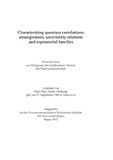Citation link:
https://nbn-resolving.org/urn:nbn:de:hbz:467-6154Files in This Item:
| File | Description | Size | Format | |
|---|---|---|---|---|
| niekamp.pdf | 783.14 kB | Adobe PDF |  View/Open |
| Dokument Type: | Doctoral Thesis | metadata.dc.title: | Characterizing quantum correlations : entanglement, uncertainty relations and exponential families Charakterisierungen von Quantenkorrelationen : Verschränkung, Unschärferelationen und exponentielle Familien |
Authors: | Niekamp, Sönke | Institute: | Fakultät IV - Naturwissenschaftlich-Technische Fakultät | Free keywords: | Quantenkorrelationen, Verschränkung, Unschärferelationen, exponentielle Familien, quantum correlations, entanglement, uncertainty relations, exponential families | Dewey Decimal Classification: | 530 Physik | GHBS-Clases: | UHEI | Issue Date: | 2012 | Publish Date: | 2012 | Abstract: | This thesis is concerned with different characterizations of multi-particle quantum correlations and with entropic uncertainty relations. The effect of statistical errors on the detection of entanglement is investigated. First, general results on the statistical significance of entanglement witnesses are obtained. Then, using an error model for experiments with polarization-entangled photons, it is demonstrated that Bell inequalities with lower violation can have higher significance. The question for the best observables to discriminate between a state and the equivalence class of another state is addressed. Two measures for the discrimination strength of an observable are defined, and optimal families of observables are constructed for several examples. A property of stabilizer bases is shown which is a natural generalization of mutual unbiasedness. For sets of several dichotomic, pairwise anticommuting observables, uncertainty relations using different entropies are constructed in a systematic way. Exponential families provide a classification of states according to their correlations. In this classification scheme, a state is considered as k-correlated if it can be written as thermal state of a k-body Hamiltonian. Witness operators for the detection of higher-order interactions are constructed, and an algorithm for the computation of the nearest k-correlated state is developed. Diese Arbeit befasst sich mit Charakterisierungen von Mehrteilchen-Quantenkorrelationen und mit entropischen Unschärferelationen. Der Einfluss statistischer Fehler auf die Detektion von Verschränkung wird untersucht. Zuerst werden allgemeine Resultate zur statistischen Signifikanz von Verschränkungszeugen erzielt, dann wird unter Verwendung eines Fehlermodells für polarisationsverschränkte Photonen gezeigt, dass Bellsche Ungleichungen mit niedrigerer Verletzung höhere Signifikanz haben können. Die Frage nach den besten Observablen zur Unterscheidung eines Zustands von der Äquivalenzklasse eines anderen wird behandelt. Zwei Maße für die Unterscheidungskraft werden definiert, und für mehrere Beispiele werden optimale Familien von Observablen gefunden. Es wird eine Eigenschaft von Stabilisatorbasen gezeigt, die eine natürliche Verallgemeinerung der mutual unbiasedness darstellt. Für Familien aus mehreren dichotomen, paarweise antikommutierenden Observablen werden Unschärferelationen mit verschiedenen Entropien systematisch konstruiert. Exponentielle Familien ermöglichen eine Klassifikation von Zuständen nach den enthaltenen Korrelationen. Hierbei wird ein Zustand als k-korreliert angesehen, wenn er sich als thermischer Zustand eines k-Teilchen-Hamiltonoperators schreiben lässt. Es werden Zeugenoperatoren zur Detektion von Wechselwirkungen höherer Ordnung konstruiert, und ein Algorithmus zur Berechnung des nächsten k-korrelierten Zustands wird entwickelt. |
URN: | urn:nbn:de:hbz:467-6154 | URI: | https://dspace.ub.uni-siegen.de/handle/ubsi/615 | License: | https://dspace.ub.uni-siegen.de/static/license.txt |
| Appears in Collections: | Hochschulschriften |
This item is protected by original copyright |
Page view(s)
511
checked on Dec 1, 2024
Download(s)
140
checked on Dec 1, 2024
Google ScholarTM
Check
Items in DSpace are protected by copyright, with all rights reserved, unless otherwise indicated.

